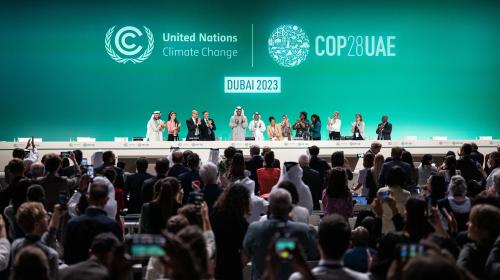Policy-makers meeting in Montreal at the 11th Conference of the Parties to the UN Framework Convention on Climate Change face a real problem. Although the Kyoto Protocol went into effect on February 16, it is becoming evident that most participating countries are unlikely to meet their Kyoto targets during the first commitment period of 2008-2012. The biggest problems are faced by countries such as Canada (the host) and Japan—although other countries such as New Zealand and even the United Kingdom have underestimated how strongly their greenhouse gas emissions are growing. Meanwhile global emissions continue to rise.
The current situation facing the participants in Montreal exposes the basic flaw in the approach followed so far in dealing with climate change policy: using short term targets and timetables to focus policy. Politically, a target sounds good because it signals that countries mean business. It can also be negotiated and monitored for compliance. The problem is that the costs of the targets chosen depend on an unknown future.
The higher emissions would have been during the future target period, the more costly it will be to bring emissions back to a historically determined target. The Kyoto target period of 2008-2012 is on the horizon. However, because of a strong world economy since the negotiation of targets in 1997 (except in parts of Europe), it appears that very few countries will hit their Kyoto targets without significant costs being incurred.
What happens after 2012? Developing countries have signaled that they do not want to take on any binding targets and timetables. And both the United States and Australia did not ratify the Kyoto Protocol in the first place, primarily because of the uncertainty around costs and the lack of concrete commitment by most greenhouse emitters.
It is not clear what will follow for the period after 2012 but it is clear what should follow: a change in the policy strategy.
The current malaise of climate policy is bad for the global environment. Short-term targets and politically driven timetables should be jettisoned and replaced with very long term targets without precise timetables. The best scientific advice should determine where the world should be heading, but getting there should NOT be based on an arbitrary timetable, but on a balancing between costs and benefits along the way.
Targets and timetables do not address the fundamental issue of uncertainty that surrounds climate policy—uncertainty in the magnitude and timing of climate change, the costs or benefits of climate change, and the costs or benefits of abatement. Policy-makers need to acknowledge the tradeoff between the economic costs of taking action and the expected environmental gains. This needs to be done around long-range targets without precise timetables. An institutional framework needs to be created in all major emitting countries which enables varied responses as future events and knowledge warrant it. Managing the risk of climate change is just as important as managing climate change itself.
What should the policy-makers in Montreal be doing to respond sensibly to the climate change issue? The first requirement is to make sure the major greenhouse emitters—particularly the United States, Europe, Japan, China, India, Brazil, and Indonesia—are involved equally in the longer run in terms of firm commitments, but differentially in the near term allowing different burden sharing along the way. It is also important that countries are responsible for their own actions but that these are coordinated across countries. A centralized framework which relies on threats and sanctions impinges too much on national sovereignty and is unhelpful in generating a cooperative approach. Countries need national climate actions which are in all domestic stakeholders self interest within each country.
The second requirement is to acknowledge that if there is a major problem to be avoided, then technological innovations in the way energy is produced and consumed will be required. However it must also be acknowledged that new technology may take many decades to emerge. To encourage this new technology, strong incentives are needed. Rather than subsidies, an alternative approach involves raising the price of carbon and allocating carbon rights, so that searching for alternatives become more profitable for companies.
The third requirement is to change the ways households and industry use energy. People and industry need an incentive to conserve. This is particularly important if the technology miracle is a long time in coming. The best way to encourage energy conservation is to build the expected environmental costs of carbon dioxide emissions into the price of carbon. If the optimists are wrong, and new technologies only work on a small scale, then conservation has a role to play while we look for the appropriate solution.
The final part of a comprehensive approach is to develop long term markets for carbon rights based on long term targets—in which people can get a clear picture of the expected future price of carbon, and risk can be managed by long term energy investors and otherS affected by climate change and climate policy. Too often people expect the government to manage risk, but in the case of climate change there is a strong case for individuals and companies to manage their own climate risks through markets.
These ideas are incorporated in the Brookings McKibbin-Wilcoxen Blueprint which is outlined elsewhere .
This week’s meeting and the refocusing on what to do after 2012 present the world with another opportunity to put in place a realistic and effective climate policy, building on much that has been achieved to date. The way forward is to shift away from the short- term targets and timetables approach (whether at the global, national or sectoral level) and shift towards a more comprehensive coordinated national based approach, built on clear long term property rights over carbon and clear incentives to reduce emissions, and adapt to climate change, wherever possible at low cost. Unfortunately for the global environment, there is a lot of “idea inertia” in the minds of many involved in the climate debate who still operate within the Kyoto Protocol mindset. It is time to move forward.
Warwick J. McKibbin is a Nonresident Senior Fellow at the Brookings Institution; a Professorial Fellow at the Lowy Institute for International Policy in Sydney and Executive Director of the Centre for Applied Macroeconomic Analysis at The Australian National University.



Commentary
Op-edGlobal Climate Change Policy Beyond 2012
November 23, 2005